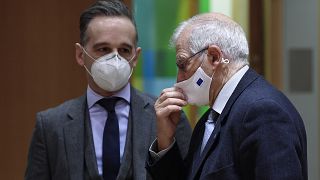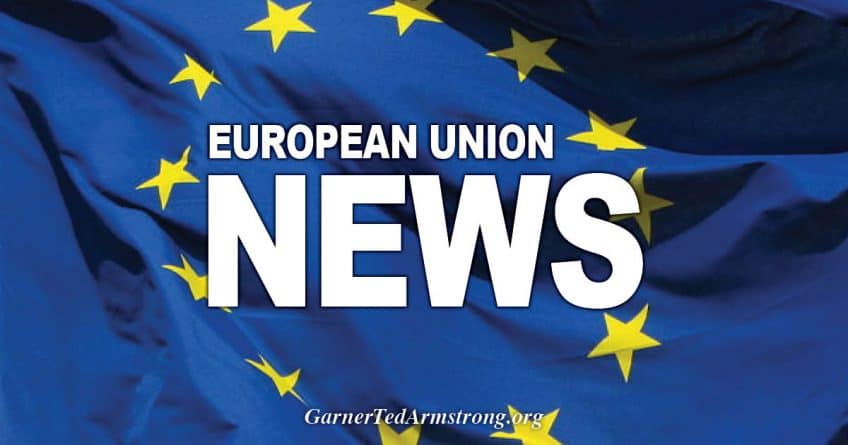
Josep Borrell and EU foreign affairs ministers will meet next week. – AP
EU countries are ready to impose new sanctions against Russia over the poisoning and imprisonment of opposition leader Alexei Navalny, Euronews has learned. A political decision is expected as early as next week.
The move comes after the widely-criticized visit of Josep Borrell, the EU’s foreign affairs chief to Moscow.
The first set of EU sanctions over the Navalny case was introduced in October, targeting six individuals and one entity believed to be involved in the poisoning of the Kremlin critic. No further action has been taken since he was jailed in early February.
Speaking on condition of anonymity due to the sensitivity of the issue, diplomatic sources told Euronews that there will likely be a political decision on the topic during next week’s Foreign Affairs Council.
The decision will then be referred to technical teams to prepare the lists of Russian individuals which will then be sent to EU ambassadors for review and approval. The consensus among member states is helping to speed up the process.
In the best-case scenario, the sanctions could be adopted by European leaders when they come together at the end of March.
Magnitsky Act
Brussels plans to use, for the first time, its recently established sanctions regime, similar to the Magnitsky Act in America.
This mechanism enables the 27 member states to punish those considered responsible for human rights abuses through the freezing of assets and travel bans.
However, sources note that there are still some differences concerning the approach and the form of these sanctions, stemming from the long-standing disagreements inside the bloc on how to handle Russia.
Countries like Poland and the Baltic states have always defended a hardline position and they would like the European Council to impose restrictive measures immediately.
Others, such as Germany, France, Greece, and Cyprus, which have traditionally closer ties with the Russian Federation, prefer to avoid extreme solutions and would rather have sanctions in place while keeping the channels of communication open.
Moreover, Croatia and Slovakia are eyeing a purchase of Sputnik V, Russia’s homegrown COVID-19 vaccine. Hungary is already using the jab as part of its vaccination campaign.
The Nord Stream 2 project, a gas pipeline between Russia and Germany, which is nearing completion, is another thorny question in the complex EU-Russia agenda, although no member state has so far brought it up during the ongoing discussions.
Decisions on foreign affairs at EU level require unanimity among member states, which often slows down – or altogether impedes – taking decisive action.
Last year, Cyprus blocked EU sanctions against Belarus because the bloc refused to act in a similar manner against Turkey over its activities in the Eastern Mediterranean. The fallout from that blockage, which made international headlines, led to the establishment of the Magnitsky Act-style regime three months later.
Action on Ankara is still an option, but remains stuck at technical level. A recent change in attitude by the government of Recep Erdoğan, together with the inauguration of US President Joe Biden, has lessened the sense of urgency.
Neither Cyprus nor Greece are expected to obstruct the Russian process.
“The two cases [Russia and Turkey] cannot be directly linked, but EU solidarity is a two-way street and member states which are now asking for solidarity, didn’t offer it when needed by others,” a diplomat told Euronews.
Sanctions but also dialogue
The new raft of sanctions follows Borrell’s controversial visit to Moscow, which was described as “a complete disaster” by MEPs. During a press conference alongside Russian Foreign Affairs Minister Sergey Lavrov, Borrell shocked some when he publicly said the EU had no plans to impose further sanctions.
The intervention was met with immediate criticism. Borrell later corrected himself and told the European Parliament that sanctions were still a possibility and that he would come up with his own proposal.
Borrell’s words prompted Lavrov to announce that Russia was ready to break off relations with the EU if such punitive measures were to be imposed.
Lavrov suggested the EU’s decision to admit Baltic and Eastern European members 15 years ago had contributed to the current poor state of relations.
Diplomatic sources don’t share Lavrov’s uncompromising thinking.
“We want to keep the channels of dialogue open and, for sure, there is no appetite to further push Russia [in]to the arms of China because cutting ties with the EU is increasing [Russia’s] dependence on China,” said an EU diplomat.
Regarding Borrell, the official said there was initial disappointment and surprise with his performance, especially when he didn’t strike back when Lavrov condemned the EU as an “unreliable partner”.
Nevertheless, national ministers remain united behind the EU’s chief diplomat, something they consider necessary to face the Russian challenge together.
The new US Secretary of State, Antony Blinken, will take part in next week’s Foreign Affairs Council meeting, after accepting an invitation from Borrell. Relations with Russia and China will be the two main topics that EU ministers will tackle with his American counterpart.
Source: https://www.euronews.com/2021/02/18/eu-is-ready-to-impose-new-sanctions-against-russia-over-navalny
[Disclaimer]









